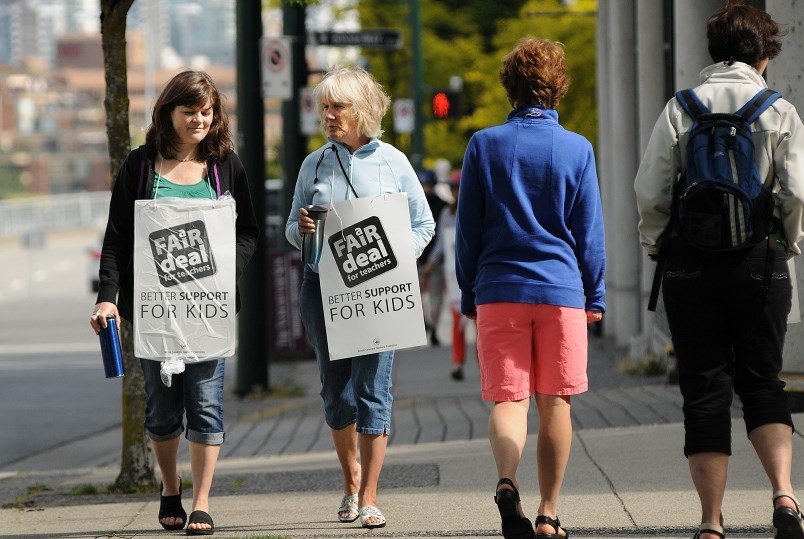It could be a rocky summer between teachers and the province, as they try to hammer out a deal — the first since the teachers won back the right to bargain on class size and composition in 2017.
The employer’s first proposal wipes out their Supreme Court win and could mean the layoff of hundreds of teachers in Metro Vancouver, BCTF president Glen Hansman says.
But the B.C. Public School Employers’ Association (BCPSEA) responded by saying the teachers’ opening proposal is unrealistic, unworkable and very expensive.
The rules governing class size, the number of special needs students in any given class and the number of specialist teachers such as librarians or counsellors were removed by the former B.C. Liberal government in 2002. Teachers fought to the nation’s highest court, which restored the deleted provisions in November 2016 after a 14-year court battle.
Since the ruling, B.C. has hired 3,700 new teachers to implement the new rules, boosting its education budget $580 million to $6.6 billion.
The province has 60 school districts, each with different rules. Vancouver’s are among the most robust, meaning classes are smaller, there are more specialist teachers and fewer students with special needs in each class. Forty districts have some class composition language, while the remaining 20 have none at all.
Hansman said the employer’s proposal calls for bigger classes in most districts, lesser provisions for special needs students than are in place now in many districts including Vancouver, and no guaranteed numbers of specific specialist teachers like librarians or counsellors. Â
Teachers are “freaking out,” Hansman said.
“It is jaw-droppingly shocking that the NDP would be bargaining like it’s 2014,” Hansman said.Â
But Alan Chell, chair of the BCPSEA board of directors and an elected school trustee in Revelstoke, said one district modelled the BCTF’s proposal and the number of teachers required would be “staggering.”
The teachers' class composition proposal would see special needs students weighted higher than other students when calculating class sizes, Chell said, calling the idea "completely unrealistic."
It would cost hundreds of millions of dollars and in many cases, there are neither the teachers nor the facilities to accommodate smaller classes, Chell said.Â
“We believe that classrooms are complex and they need to be addressed, but we believe the best way to do that is collegially in the school, based on student need,” Chell said. “One of the premises of public education is that it’s equitable around the province.”
Chell said the restored language dates back to the 1990s and needs to be modernized.
BCTF did its own modelling, based on the employer’s class size data, and found that hundreds of teachers would be laid off in some Metro districts, Hansman said.
Districts with smaller class sizes and more specialist teachers — such as Vancouver, Surrey, Burnaby, Richmond, Victoria, Sook, Saanich, Nanaimo and Langley — would be the hardest hit, Hansman said.
Those districts are also home to most of the BCTF membership, Hansman said.
Teachers are asking for the government-mandated two per cent wage increase in each of the next three years, Hansman said. However, they are also asking to shorten the salary grid to increase wages for new teachers and to add a new level at the top for long-term teachers. Chell said the grid adjustment is equivalent to another seven per cent increase and that teachers have also asked for a four per cent labour market adjustment.
But Hansman said even with those increases, it would only bring B.C. teachers close to the average teacher’s wage across Canada.
He urged school trustees to question how the proposal could affect their districts.
Janet Fraser, chair of the Â鶹´«Ă˝Ół»School Board, said VSB is in ongoing contact with BCPSEA as bargaining continues.
“My hope is that there is a negotiated agreement with no interruption to student learning,” Fraser said.
Both Chell and Hansman said the same. Bargaining will continue to June 30 and could proceed throughout summer.
After 14 years in court, teachers aren’t going to give up what they won back. At the same time, it’s true things are not equitable across the province. Teachers want everyone to level up, meeting at the top, while the employer wants those in districts with strong language to concede so that districts without any provisions will gain.
For the sake of everyone — students, parents, teachers, taxpayers — let’s hope common ground is found before school starts again in the fall, not like 2014 when schools were closed for a six-week strike. Like the 14-year court battle, that’s a situation nobody wants to revisit.



